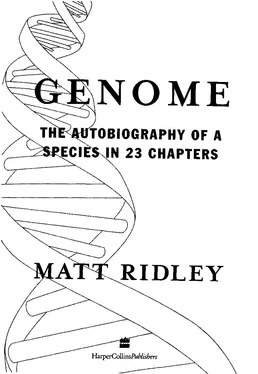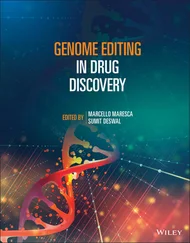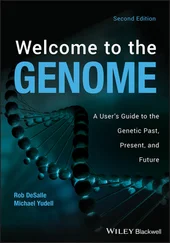Genome - Matt Ridley
Здесь есть возможность читать онлайн «Genome - Matt Ridley» весь текст электронной книги совершенно бесплатно (целиком полную версию без сокращений). В некоторых случаях можно слушать аудио, скачать через торрент в формате fb2 и присутствует краткое содержание. Жанр: Старинная литература, на английском языке. Описание произведения, (предисловие) а так же отзывы посетителей доступны на портале библиотеки ЛибКат.
- Название:Matt Ridley
- Автор:
- Жанр:
- Год:неизвестен
- ISBN:нет данных
- Рейтинг книги:5 / 5. Голосов: 1
-
Избранное:Добавить в избранное
- Отзывы:
-
Ваша оценка:
- 100
- 1
- 2
- 3
- 4
- 5
Matt Ridley: краткое содержание, описание и аннотация
Предлагаем к чтению аннотацию, описание, краткое содержание или предисловие (зависит от того, что написал сам автор книги «Matt Ridley»). Если вы не нашли необходимую информацию о книге — напишите в комментариях, мы постараемся отыскать её.
Matt Ridley — читать онлайн бесплатно полную книгу (весь текст) целиком
Ниже представлен текст книги, разбитый по страницам. Система сохранения места последней прочитанной страницы, позволяет с удобством читать онлайн бесплатно книгу «Matt Ridley», без необходимости каждый раз заново искать на чём Вы остановились. Поставьте закладку, и сможете в любой момент перейти на страницу, на которой закончили чтение.
Интервал:
Закладка:
This kind of conflict between complexes of genes (the Y chromosome being one such complex), does not just apply to sex. Suppose that there is a version of a gene that increases the telling of lies (not a very realistic proposition, but there might be a large set of genes that affect truthfulness indirectly). Such a gene might thrive by making its possessors into successful con-artists. But then suppose there is also a version of a different gene (or set of genes) that improves the detecting of lies, perhaps on a different chromosome.
That gene would thrive to the extent that it enabled its possessors to avoid being taken in by con-artists. The two would evolve antagonistically, each gene encouraging the other, even though it would be quite possible for the same person to possess both. There is between them what Rice and Holland call 'interlocus contest 1 1 6 G E N O M E
evolution', or I C E . Exactly such a competitive process probably did indeed drive the growth of human intelligence over the past three million years. The notion that our brains grew big to help us make tools or start fires on the savannah has long since lost favour.
Instead, most evolutionists believe in the Machiavellian theory —
that bigger brains were needed in an arms race between manipulation and resistance to manipulation. 'The phenomena we refer to as intelligence may be a byproduct of intergenomic conflict between genes mediating offense and defense in the context of language', write Rice and Holland.10
Forgive the digression into intelligence. Let's get back to sex.
Probably one of the most sensational, controversial and hotly disputed genetic discoveries was the announcement by Dean Hamer in 1993 that he had found a gene on the X chromosome that had a powerful influence on sexual orientation, or, as the media quickly called it, 'a gay gene'.11 Hamer's study was one of several published about the same time all pointing towards the conclusion that homosexuality was 'biological' — as opposed to being the consequence of cultural pressure or conscious choice. Some of this work was done by gay men themselves, such as the neuroscientist Simon LeVay of the Salk Institute, keen to establish in the public mind what they were convinced about in their own minds: that homosexuals were
'born that way'. They believed, with some justice, that prejudice would be less against a lifestyle that was not a deliberate 'choice'
but an innate propensity. A genetic cause would also make homosexuality seem less threatening to parents by making it clear that gay role models could not turn youths gay unless they had the propensity already. Indeed conservative intolerance of homosexuality has recently taken to attacking the evidence for its genetic nature.
"We should be careful about accepting the claim that some are "born to be gay", not just because it is untrue, but because it provides leverage to homosexual rights organisations', wrote the Conservative Lady Young in the Daily Telegraph on 29 July 1998.
But however much some of the researchers may have desired a particular outcome, the studies are objective and sound. There is C O N F L I C T 1 1 7
no room for doubt that homosexuality is highly heritable. In one study, for example, among fifty-four gay men who were fraternal twins, there were twelve whose twin was also gay; and among fifty-six gay men who were identical twins, there were twenty-nine whose twin was also gay. Since twins share the same environment, whether they are fraternal or identical, such a result implies that a gene or genes accounts for about half of the tendency for a man to be gay.
A dozen other studies came to a similar conclusion.12
Intrigued, Dean Hamer decided to seek the genes that were involved. He and his colleagues interviewed no families with gay male members and noticed something unusual. Homosexuality seemed to run in the female line. If a man was gay, the most likely other member of the previous generation to be gay was not his father but his mother's brother.
That immediately suggested to Hamer that the gene might be on the X chromosome, the only set of nuclear genes a man inherits exclusively from his mother. By comparing a set of genetic markers between gay men and straight men in the families in his sample, he quickly found a candidate region in Xq2 8, the tip of the long arm of the chromosome. Gay men shared the same version of this marker seventy-five per cent of the time; straight men shared a different version of the marker seventy-five per cent of the time.
Statistically, that ruled out coincidence with ninety-nine per cent confidence. Subsequent results reinforced the effect, and ruled out any connection between the same region and lesbian orientation.
To canny evolutionary biologists, such as Robert Trivers, the suggestion that such a gene might lie on the X chromosome immediately rang a bell. The problem with a gene for sexual orientation is that the version that causes homosexuality would quite quickly become extinct. Yet it is plainly present in the modern population at a significant level. Perhaps four per cent of men are definitively gay (and a smaller percentage bisexual). Since gay men, are, on average, less likely to have children than straight men, the gene would be doomed to have long since dwindled in frequency to vanishing point unless it carried some compensating advantage.
I I 8 G E N O M E
Trivers argued that, because an X chromosome spends twice as much time in women as it does in men, a sexually antagonistic gene that benefited female fertility could survive even if it had twice as large a deleterious effect on male fertility. Suppose, for example, that the gene Hamer had found determined age of puberty in women, or even something like breast size (remember, this is just a thought experiment). Each of those characteristics might affect female fertility. Back in the Middle Ages, large breasts might mean more milk, or might attract a richer husband whose children were less likely to die in infancy. Even if the same version of the same gene reduced male fertility by making sons attracted to other men, such a gene could survive because of the advantage it gave daughters.
Until Hamer's gene itself is found and decoded, the link between homosexuality and sexual antagonism is no more than a wild guess.
Indeed, it remains a possibility that the connection between Xq28
and sexuality is misleading. Michael Bailey's recent research on homosexual pedigrees has failed to find a maternal bias to be a general feature. Other scientists, too, have failed to find Hamer's link with Xq28. At present it looks as if it may have been confined to those families Hamer studied. Hamer himself cautions that until the gene is in the bag, it is a mistake to assume otherwise.14
Besides, there is now a complicating factor: a completely different explanation of homosexuality. It is becoming increasingly clear that sexual orientation correlates with birth order. A man with one or more elder brothers is more likely to be gay than a man with no siblings, only younger siblings, or with one or more elder sisters.
The birth order effect is so strong that each additional elder brother increases the probability of homosexuality by roughly one-third (this can still mean a low probability: an increase from three to four per cent is an increase of thirty-three per cent). The effect has now been reported in Britain, the Netherlands, Canada and the United States, and in many different samples of people.15
For most people, the first thought would be a quasi-Freudian one: that something in the dynamics of growing up in a family with elder brothers might predispose you towards homosexuality. But, C O N F L I C T 1 1 9
as so often, the Freudian reaction is almost certainly the wrong one. (The old Freudian idea that homosexuality was caused by a protective mother and a distant father almost certainly confused cause and effect: the boy's developing effeminate interests repel the father and the mother becomes overprotective in compensation.) The answer probably lies, once more, in the realm of sexual antagonism.
Читать дальшеИнтервал:
Закладка:
Похожие книги на «Matt Ridley»
Представляем Вашему вниманию похожие книги на «Matt Ridley» списком для выбора. Мы отобрали схожую по названию и смыслу литературу в надежде предоставить читателям больше вариантов отыскать новые, интересные, ещё непрочитанные произведения.
Обсуждение, отзывы о книге «Matt Ridley» и просто собственные мнения читателей. Оставьте ваши комментарии, напишите, что Вы думаете о произведении, его смысле или главных героях. Укажите что конкретно понравилось, а что нет, и почему Вы так считаете.












